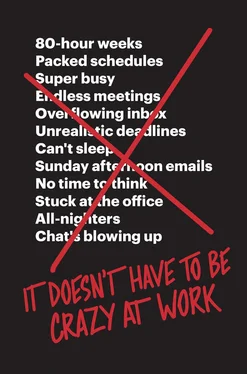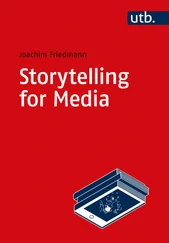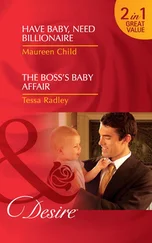Jason Fried, David Heinemeier Hansson
It Doesn’t Have to Be Crazy at Work

HarperCollins Publishers
1 London Bridge Street
London SE1 9GF
www.harpercollins.co.uk
First published in the US by Harper Business, an imprint of HarperCollins Publishers 2018
This UK edition published by HarperCollins Publishers 2018
FIRST EDITION
Text © Jason Fried and David Heinemeier Hansson 2018
Illustrations © Jason Zimdars
Cover design courtesy of the authors © HarperCollins Publishers Ltd 2018
Grateful acknowledgement is made for permission to reprint from “What Light”.
Words and Music by Jeff Tweedy © 2007 Words Ampersand Music (BMI)/Poeyfarre Music (BMI)/Pear Blossom Music (BMI).
All Rights Administered by BMG Rights Management (US) LLC.
Used with Permission. All Rights Reserved.
A catalogue record of this book is available from the British Library
Jason Fried and David Heinemeier Hansson assert the moral right to be identified as the authors of this work
All rights reserved under International and Pan-American Copyright Conventions. By payment of the required fees, you have been granted the nonexclusive, non-transferable right to access and read the text of this e-book on screen. No part of this text may be reproduced, transmitted, downloaded, decompiled, reverse engineered, or stored in or introduced into any information storage retrieval system, in any form or by any means, whether electronic or mechanical, now known or hereinafter invented, without the express written permission of HarperCollins e-books.
Find out about HarperCollins and the environment at www.harpercollins.co.uk/green
Source ISBN: 9780008323448
Ebook Edition © October 2018 ISBN: 9780008323455
Version 2018-09-10
From Jason Fried:
To my family, to opportunity, and to luck—I’m fortunate to have you. Love and thanks.
From David Heinemeier Hansson:
To Jamie, Colt, and Dash for the love that gives patience and perspective to seek calm at work.
How often have you heard someone say “It’s crazy at work”? Maybe you’ve even said it yourself. For many, “It’s crazy at work” has become their normal. But why so crazy?
There are two primary reasons: (1) The workday is being sliced into tiny, fleeting work moments by an onslaught of physical and virtual distractions. And (2) an unhealthy obsession with growth at any cost sets towering, unrealistic expectations that stress people out.
It’s no wonder people are working longer, earlier, later, on weekends, and whenever they have a spare moment. People can’t get work done at work anymore. That turns life into work’s leftovers. The doggie bag.
What’s worse is that long hours, excessive busyness, and lack of sleep have become a badge of honor for many people these days. Sustained exhaustion is not a badge of honor, it’s a mark of stupidity.
And it’s not just about organizations—individuals, contractors, and solopreneurs are burning themselves out in the very same way.
You’d think that with all the hours people are putting in, and all the promises of new technologies, the load would be lessening. It’s not. It’s getting heavier.
But the thing is, there’s not more work to be done all of a sudden. The problem is that there’s hardly any uninterrupted, dedicated time to do it. People are working more but getting less done. It doesn’t add up—until you account for the majority of time being wasted on things that don’t matter.
Out of the 60, 70, or 80 hours a week many people are expected to pour into work, how many of those hours are really spent on the work itself? And how many are tossed away in meetings, lost to distraction, and withered away by inefficient business practices? The bulk of them.
The answer isn’t more hours, it’s less bullshit. Less waste, not more production. And far fewer distractions, less always-on anxiety, and avoiding stress.
Stress is passed from organization to employee, from employee to employee, and then from employee to customer. Stress never stops at the border of work, either. It bleeds into life. It infects your relationships with your friends, your family, your kids.
The promises keep coming. More time-management hacks. More ways to communicate. And new demands keep piling up. To pay attention to more conversations in more places, to respond within minutes. Faster and faster, for what?
If it’s constantly crazy at work, we have two words for you: Fuck that. And two more: Enough already.
It’s time for companies to stop asking their employees to breathlessly chase ever-higher, ever-more-artificial targets set by ego. It’s time to give people the uninterrupted time that great work demands. It’s time to stop celebrating crazy at work.
For nearly 20 years we’ve been working at making Basecamp a calm company. One that isn’t fueled by stress, or ASAP, or rushing, or late nights, or all-nighter crunches, or impossible promises, or high turnover, or consistently missed deadlines, or projects that never seem to end.
No growth-at-all-costs. No false busyness. No ego-driven goals. No keeping up with the Joneses Corporation. No hair on fire. And yet we’ve been profitable every year we’ve been in business.
We’re in one of the most competitive industries in the world. In addition to tech giants, the software industry is dominated by startups backed by hundreds of millions of dollars in venture capital. We’ve taken zero. Where does our money come from? Customers. Call us old-fashioned.
As a software company, we’re supposed to be playing the hustle game in Silicon Valley, but we don’t have a single employee in the Valley. In fact, our staff of 54 is spread out across about 30 different cities around the world.
We put in about 40 hours a week most of the year and just 32 in the summer. We send people on month-long sabbaticals every three years. We not only pay for people’s vacation time, we pay for the actual vacation, too.
No, not 9 p.m. Wednesday night. It can wait until 9 a.m. Thursday morning. No, not Sunday. Monday.
Are there occasionally stressful moments? Sure—such is life. Is every day peachy? Of course not—we’d be lying if we said it was. But we do our best to make sure those are the exceptions. On balance we’re calm—by choice, by practice. We’re intentional about it. We’ve made different decisions from the rest.
We’ve designed our company differently. We’re here to tell you about the choices we’ve made and why we’ve made many of them. There’s a path for any company willing to make similar choices. You’ve got to want it, but if you do you’ll realize it’s much nicer over here. You can have a calm company, too.
The modern workplace is sick. Chaos should not be the natural state at work. Anxiety isn’t a prerequisite for progress. Sitting in meetings all day isn’t required for success. These are all perversions of work—side effects of broken models and follow-the-lemming-off-the-cliff worst practices. Step aside and let the suckers jump.
Calm is protecting people’s time and attention.
Calm is about 40 hours of work a week.
Calm is reasonable expectations.
Calm is ample time off.
Calm is smaller.
Calm is a visible horizon.
Calm is meetings as a last resort.
Calm is asynchronous first, real-time second.
Читать дальше













